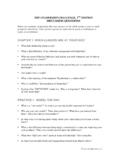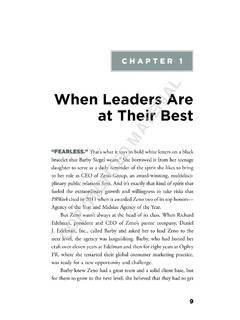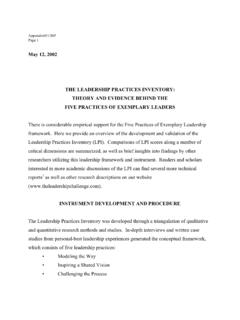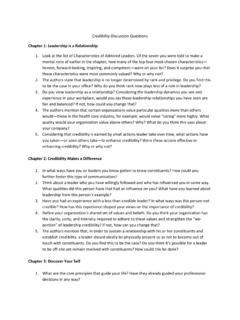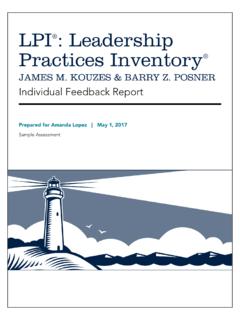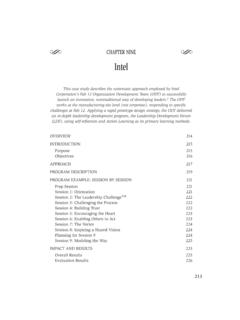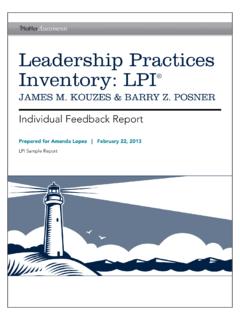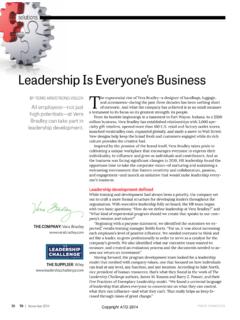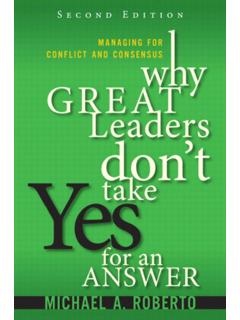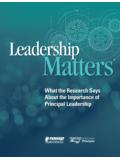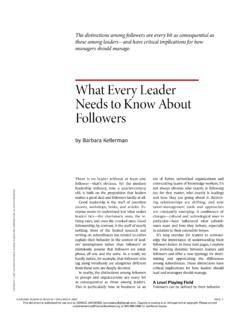Transcription of Discussion Questions for A Leader’s Legacy
1 Discussion Questions for A Leader's Legacy Chapter 1: leaders Serve and Sacrifice 1. Do you think leadership involves a certain amount of suffering? Why or why not? 2. This chapter explores the notion that only leaders who serve earn commitment. In what ways do you serve your constituents? 3. Compare the idea of have to motivation with I want motivation. What impact will each of these have on an organization? Chapter 2: The Best leaders are Teachers 1. Why do you think teaching and leading are so closely intertwined? 2. How often do you teach others? What have you learned from teaching? 3. Think about your favorite teacher(s). What do they do that makes them such good teachers? Can you use any aspects of their teaching style in your own leadership style? Chapter 3: We All Need Loving Critics 1. How often do you take the initiative to ask for feedback? What have you learned as a result of doing this? 2. What is the best piece of feedback you have received? What made it good feedback?
2 3. To what extent do you think anonymity factors in to the quality of feedback? Chapter 4: You are the Most Important Leader in Your Organization 1. Recall the piece of evidence showing a direct correlation between corporate executives' career success and the relationship they had with their first supervisor. What type of relationship did you have with your first supervisor? How has it affected your relations with future supervisors? How has it affected your career overall? 2. To what extent are you influencing someone else's performance, thoughts, and actions? Are you satisfied with the way you influence others? Why or why not? 3. How are you doing as a leader? What is your assessment of your own leadership efforts? Chapter 5: No One Likes to Be an Assumption 1. Why is encouragement such a significant part of leadership? How important is encouragement to you? 2. Do you agree with the statement that nothing significant can ever be achieved unless people feel appreciated by their leaders ?
3 Why or why not? 3. How and how often do you show your appreciation for others' contributions? How has this impacted their performance? Chapter 6: Leadership is Personal 1. Think about a leader you admire. To what extent is his or her leadership personal ? How much did that leader reveal about his or her personal life? What effect did that have on your relationship? 2. Would knowing more about a leader's personal life make you more inclined to trust that leader? Why or why not? 3. Consider Sergey's anecdote about having an unprecedented dinner with his constituents. What benefits do you think Sergey gained from learning more about his subordinates? Chapter 7: leaders Should Want to Be Liked 1. Do you respect any leaders you don't like? Why or why not? 2. The authors state that if given a choice, they would choose liking over respect. What would you choose and why? 3. Do you work hard at being liked? How do you act or behave in order to ensure that others like you? Chapter 8: When You Don't See Eye to Eye, Seek to Understand 1.
4 Do you see eye to eye with your leader or your constituents? Why do you think this is? 2. Does the expression Your enemy is your teacher resonate with you? When have you learned from yourself in a time of serious conflict? 3. What does the term constructive insubordination mean to you? Have you ever engaged in constructive insubordination? Explain. Chapter 9: You Can't Take Trust for Granted 1. What does trust look like to you? How do you as a leader know whether or not you can trust your constituents? 2. Think about a time in your life when, as with Barry in the trust fall anecdote, trust was taken for granted. How did you respond to this? What do you think about the idea that one must continue to work on trust even after it has been taken for granted? 3. What have you been doing to build trust? How effective has this been? Chapter 10: Let Your People Go 1. What do you think it means to be responsible? 2. How do you approach tasks when you feel personally responsible for the outcome?
5 How does this affect your performance? 3. What is problematic about micromanaging? Have you seen issues with micromanaging in your own life? Chapter 11: Lead from the Inside Out 1. What Questions would you want to ask of your new leader? Why would you want to know these things specifically? 2. Why is it important to be clear about your values? 3. The last sentence of this chapter poses an interesting question. If you were the new leader walking into a room, how would you answer the question Who are you ? Chapter 12: Forward Looking is a Leadership Prerequisite 1. How important is it to you that your leader be forward looking ? Why? 2. In what ways do you demonstrate your ability to be forward looking? How has this helped you? 3. The authors write that when it comes to being forward looking, You don't have to do this all by yourself. How could you get others involved in being forward looking? Chapter 13: It's Not Just the Leader's Vision 1. How can leaders start the process of forming a collective vision based on their constituents' desires?
6 2. As this chapter explains, leaders don't find out others' visions based upon directly asking people what their visions are. What do you think you would need to know about someone in order to know what they want? 3. Think about a relationship you had with a leader. Did you feel that he or she understood your vision? How did this understanding (or lack thereof) impact your relationship and/or performance? Chapter 14: Liberate the Leader in Everyone 1. Have extraordinary circumstances or situations ever driven you or someone you know to become a leader? If so, how did you (or they) do as a leader with no formal preparation? What does this tell you about leadership? 2. Why do you think people believe that management skills can be learned, but that leadership skills cannot? Have you ever believed this? 3. Are there any skills you have always assumed to be innate? If so, has this notion of leadership as a teachable quality changed your mind about any of them? Explain. Chapter 15: leaders Are Followers, Too!
7 1. Being a follower can have a negative connotation, but this chapter explains the importance of following. What do you think it really means to be a follower? 2. Why is following important? Consider both this chapter and experiences from your life. 3. How do you as a leader demonstrate your ability to follow? Chapter 16: There's Courage in All of Us 1. Discuss your own moment of courage. What happened? Was courage a state of mind for you in that moment, or was it another feeling entirely? Explain. 2. The authors take care to emphasize that courage is not defined by stereotypical acts of heroism; on the contrary, they write, it manifests itself daily. When did you witness or experience courage today? What made it courageous? 3. Look at the list of moments when people call upon their courage. What would you add to that list? Chapter 17: You Can't Plan to Be Courageous, But You Can Choose It 1. What role does courage play in your life? As Peter Block asks, In what ways have you been courageous?
8 2. Of the three courage themes outlined in this chapter, do you find yourself identifying with any theme in particular? Why? 3. Taking into consideration your own experiences with courage, what courage theme would you add to this list? Explain. Chapter 18: It Takes Courage to Make a Life 1. The authors write that a Rosa Parks Moment is created when initiative is applied to a core value's challenge. Do you agree with this definition? What do you think it takes to create a Rosa Parks Moment? 2. When was your last Rosa Parks Moment? What impact did this moment have on your life? 3. This chapter describes three lessons one can take away from Rosa Parks in her groundbreaking moment. Considering all the Rosa Parks Moments you have witnessed your own and others' . are there any other lessons about courage, leadership, or Legacy you have gained from these experiences? Chapter 19: The Courage to Be Human 1. Why is humility an important quality in a leader? 2. Consider Kirk Hanson's list of the foolish attitudes that can reveal a leader's Achilles' heel.
9 Have you ever adopted any of these attitudes or been on the receiving end of any? How did this affect you, as either a leader or a constituent? 3. How humble are you in your leadership role? How do you show your humility? Chapter 20: Failure Is Always an Option 1. What have your failures taught you? Do you think they were valuable learning experiences? Why or why not? 2. What attitude towards failure is exhibited in your professional life? Do you feel that you work in an environment where failure is, while not pleasant, an experience to at least learn from? 3. How do you handle your failures? How could you improve the way you handle failure? Chapter 21: No Money Back Guarantee 1. The authors quote David Whyte, who says that the great question of leadership is to make everything more personal. How do you make leadership personal to you? What gifts and talents do you bring to your leadership style? 2. This chapter explores the idea that too much of any leadership practice can become destructive.
10 Is there any strength or practice in particular you think you would have the most trouble exercising in moderation? How do you prevent yourself from going overboard with your strengths? 3. The closing paragraph of this chapter tells us that one of our challenges is to stay focused on the difference we want to make. What difference do you want to make as a leader? Contributed by Shauna Robinson, a Wiley employee based in San Francisco.
